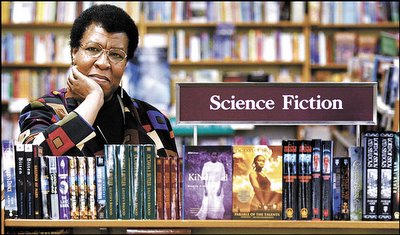
This morning in our monthly telephonic grip session, The Fierceness told me that Octavia Butler died last Friday in a freak and incredibly tragic accident. At this particular moment of danger for our nation’s soul, this is an acute loss of a prescient and innovative voice. Butler was a unique and talented writer of science fiction and near-future fiction genre, and her many works, Kindred, Clay’s Ark, Adulthood Rites, Wild Seed, Lilith’s Brood, Parable of the Sower, Parable of the Talents, and Fledgling, among others, are a refreshing take on a literary genre that can be at times suffocatingly conservative. Her work combined gender, race, and social analysis with a sharp eye towards the interconnected nature of these conditions on the human soul.
I can’t make up my mind as to whether the underreporting of her death is indicative of the ways in which our culture doesn’t take writers seriously anymore, or the general anti-intellectualism that pervades our media culture. In any event, there is some good coverage of her life and career here, here, and here.
I first discovered Butler’s work as a teaching assistant in Professor Big-Shot Science Theorist’s undergrad survey course on science and the humanities, where we read Dawn. Professor Big-Shot was less than impressive, however Butler’s work stayed with me, and by and by, I came to read her Parable series, which although dark and brooding, was remarkably influential on my thinking about society, culture, hope, and despair.
In brief, the Parable series (Parable of the Sower and its sequel, Parable of the Talents) follows the life of Lauren Olamina, a complicated and talented 15-year old black girl living in the detritus of California in the year 2024. Civil society and social order has completely broken down, and we follow Lauren as her community is destroyed and she embarks on a quest of survival, spirituality, and the resurrection of the communal in a dystopia ruled by fear, corruption, visceral violence, and corporate and state greed. One of Lauren’s special skills, or talents, is that she is an “empath”: she can feel others pain and pleasure as much as her own. This focus on feeling, literally and figuratively, transforms Lauren’s worldview, and pushes her to imagine alternative solutions to the crises that confront her society, which may soon be our own.
The series spoke to me not only because of its strongly dystopian vision of possible futures for the United States (some of which seem to be coming true as we speak), but also because the central narrator, Lauren, is not a uni-dimensional heroine in the manner of some fiction by writers of colour. Like all of Butler’s narrators, Lauren is achingly human: unsure, wise, reckless, headstrong, afraid, powerful, confused, shortsighted, and visionary. The second book in the series, Parable of the Talents, is written from the perspective of her lost daughter Larkin, and continues with the remarkable unfolding of Lauren’s story as a flawed but brilliant diamond.
Lauren’s quest is not about resolving contradictions and choices through the guise of certainty, but about embracing change, even when such an embrace has unforeseen or violently transformative consequences. Lauren, in a word, attempts, as The Fierceness says, “to build a home and a life in the abyss [of uncertainty].” In fact, Butler underscores the message that choosing certainty over risk and change is the road to a slow death and ultimate destruction.
While reading these novels in the boom years of the late nineties, they seemed more like intellectual exercises in human emotion and survival. Now that we as a republic are faced with the hour of our own potential doom, through a rapaciously criminal administration, the corruption of Congress and the Supreme Court, and the death of popular outrage, we walk the perilous edge of brutal oligarchy and fascism. Butler’s novels offer a primer to survive what may become a long period of national emergency, one that may severely test our ability to maintain humane values, much less the national ideals embodied by our founding documents. We can only hope that we can foster individuals (or become ourselves) like Lauren and her cohort of principled survivors as we face what may lie ahead.
If those of us who take literature seriously can appreciate anything, it is the difficult task of creating embodied and complex narratives and characters that capture elemental aspects of the human condition.
In this regard, Butler was a master. She will be desperately missed.



1 comment:
That is a great summary. I need to finish "Parable of the Talents".
She will be missed.
Post a Comment